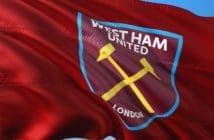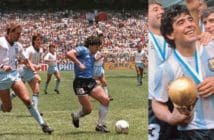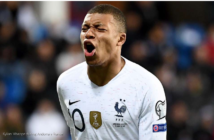
Bobby McMahon Joins Prost Amerika's World Cup Coverage with an Exclusive Group E Preview
Fox Soccer Channel’s Chief Analyst is without doubt the top commentator on the sport in North America.
Previously seen mostly in tandem with host Jeremy St Louis on the Fox Soccer Report, this year Bobby’s clarity, immense knowledge and ability to explain the game to diehards and learners alike, has seen Fox expand his role to increased studio appearances, especially for Champions League and international football.
Therefore we are very honoured to add his insight to our unique World Cup team comprised of America’s top TV analyst, the cream of writers from around the USA, Seattle soccer writers, local Seattle ex-patriots bringing insight to groups involving their own side and MLS insiders taking a day off from their club duties.
In this preview exclusively for Prost Amerika, Bobby looks at the intriguing Group E with the temperamental but talented Dutch, the perennially calm Danes, Africa’s potential surprise side Cameroon and the unfancied short-passing Japanese.
Group E Preview
“The last eight is a reasonable expectation for the Netherlands”
by Bobby McMahon
NETHERLANDS
It is often said that Brazil is everyone’s favourite second team when the World Cup Finals come around. For fans who came of footballing age in the 70s that might not necessarily be the case.
Watching the Dutch team of Johan Cruyff, Rudd Krol, Johan Neeskens and Wim van Hanegem was, for many, a defining moment in their footballing education.
The European Cup winning sides of Feyenoord and Ajax had already led Dutch football to the forefront of club football but few could have anticipated the impact that the Dutch would have on the ’74 World Cup and beyond. Coach Rinus Michels not only found a way to meld the talents from two great teams but also to fundamentally change the way we looked at the game and how it could be played.
Although the concept of “total football†never truly bore fruit beyond Michels’ Ajax and the Dutch national side, many of the concepts remain relevant today and the Dutch of the 70s are still accepted as one of the benchmarks against which great sides are measured.
Unfortunately every Netherlands side is also measured against the same yardstick. So what can we anticipate this time around? On the positive side the Dutch qualified with eight wins from eight games while allowing only two goals against. The negative is that the Little Sisters of Mercy Under-16’s might have provided tougher opposition than Scotland, Norway, Macedonia and Iceland.
The Dutch can expect to have a solid look with Mark Van Bommel and Nigel De Jong shielding the back four. Further forward the Dutch are spoilt for choice with the likes of Raphael van der Vaart, Wesley Sneijder and Arjen Robben all nicely fitting our stereotypical view of Dutch players as technically sound, a bit temperamental and very stubborn.
Others such as Ibrahim Afellay and Eljero Elia also provide options to coach Bert Van Marwijk while Dirk Kuyt’s grittiness stands in sharp contrast to his polished teammates skills. In attack the Dutch are likely to start with a lone striker who will have the option to drift wide and deep. Robin Van Persie fits that identikit nicely and if a more traditional striker is required then Klaus Jan Huntelaar will be available.
Despite an impressive defensive record in qualifying the Dutch back four do not inspire confidence. Gregory van der Wiel is penciled in at right back and it will be no surprise if he moves from Ajax before the new season gets underway. Everton’s John Heitinga, veteran André Ooijer and Joris Mathijsen are set to fight it out for the two centre back positions with Captain Giovanni van Bronckhorst sliding in at left back.
Van Bronckhorst has always been an effective and exciting player going forward whether it be as a midfielder or later in his career as a left back. However, an inability to tackle well and a propensity to lose concentration at key moments finger him as a significant weakness.
Fortunately for the Dutch they have not been drawn in an overly difficult group and may also garner a decent draw in the last sixteen. The last eight is a reasonable expectation for the Netherlands with anything beyond a case of over-achievement.
DENMARK
Managerial longevity is often put forward as the silver bullet that will ultimately lead to silverware. Â However, in most cases the reality is very different. More times than not a long-serving manager is an indication that the man in charge has a record of coaxing performances out of his side that far outstrip the talent pool.
Such seems to be the case with Danish Coach Morten Olsen who has been in charge of Denmark for close to a decade – a commitment that far outstrips any other coach at the 2010 World Cup Finals.
Drawn in a qualifying group with Portugal, a side that has made it to the semi finals in 2006, and habitual major tournament qualifiers Sweden, a third place finish with an outside hope of grabbing a play-off spot seemed to be the best possible outcome for Denmark.
In the end it turned out very differently as Denmark beat Portugal in Lisbon and drew in Copenhagen while beating a well-past-their-shelf-life Sweden twice. The only loss came against Hungary and only after the group had been won.
What is more automatic qualification was achieved while dealing with an epidemic of injury problems that saw Olsen use over 40 players through the ten games and never fielding the same back four in consecutive matches.
Goalkeeper Thomas Sorensen’s specialty is saving penalty kicks but whether he will get a chance at the Finals is still unclear. A dislocated elbow was sustained in April while playing for Stoke against Chelsea and although the first choice keeper has been included in the preliminary Danish squad his fitness is likely to be in doubt right up to the kick-off.
The Danes are well-served at centre back with Palermo’s Simon Kjaer and Liverpool’s Daniel Agger normally Olsen’s preference. Kjaer’s displays in Serie A have been excellent this past season and he seems destined to become one of Europe’s defenders over the next decade.
Defensive and attacking midfield options very much fit into the veteran category. Christian Poulsen played in all ten qualifiers and appears to be a certain starter in front of the back four – possibly alongside Martin Jorgensen.
Dennis Rommedahl and Jon Dahl Tomasson are expected to contribute to the attack although neither scored during group qualifying. Both players bring loads of experience to the squad but there is a definite sense that they now struggle to compete at the highest level.
Arsenal striker Nicolas Bendtner scored three goals – including a vital equalizer against Portugal in Copenhagen – and will probably get the nod and be asked to fill the lone striker role.  Soren Larsen of Duisberg, who finished as the Danes top scorer in qualifying with 5 goals, could be the first attacker off the substitute’s bench should the need arise.
Overall the Danes have some young players who we can expect to improve in the next few seasons, crafty veterans and a solid core of journeyman. What they lack are a couple of world class players in their prime years. The Danes’ spirit may make them difficult to beat but it may not be enough to move them into the last sixteen.
JAPAN
In sport winning does not always get you the credit; more often than not it comes down to exceeding expectations. How else can you explain the receptions countries such as the Republic of Ireland received on their return home after the 90, 94 and 2002 World Cups versus that accorded Brazil in 1994?
The Irish were feted by hundreds of thousands of their countrymen even though on each occasion they never won more than one game. On the other hand Brazil may have won the World Cup in 1994 but not in a style that Brazilian supporters expected. Five wins, a draw (meaningless because qualifying had already been assured) and win on penalty kicks in the final against Italy after a sterile scoreless draw was not enough to satisfy the fans. While Ireland Coach Jack Charlton was a candidate for sainthood, the man that guided Brazil to their fourth World Championship, Carlos Alberto Parreira was vilified at home.
It is a lesson that Japan Coach Takeshi Okada may have have missed. To suggest, as Okada has done, that Japan will reach the semi finals is to say the least, extremely optimistic perhaps even delusional. Certainly there is nothing in Japan’s previous performances (one draw and five losses in the six games held outside of Japan at the World Cup Finals) to give cause for such a positive prediction.
A look in the rear-view mirror of group qualifying gives no great clue either as to why the Japan Coach is so buoyant in his outlook. The fact that Japan was the first country to qualify for South Africa 2010 was more to do with datelines and scheduling than impressive and dominating displays.
Fifteen points from eight games was enough to qualify comfortably as runners up to group winners Australia but it also meant that the Aussies were put under very little pressure.
Japan enters the tournament with what should be a fairly settled side. During the two-stage Asia qualifying process a dozen players played in over half the fourteen games. At the centre of the defense Japan will have experience with Captain Yuji Nakazawa and Marcus Tulio Tanaka likely playing just a little deeper.
The strength of the team looks to be in midfield with a wide array of choices available. Former Reggina, Celtic and Espanyol midfielder Shunsuke Nakamura will be highlighted in glossy supplements and in depth blogs and articles as Japan’s star man. The reality is that Nakamura is coming off a terrible last twelve months. After leaving Celtic for Espanyol Nakamura was unable to establish himself as a regular first teamer in Spain and bolted home to Yokohama F. Marinos in February of this year.
The effectiveness of the midfield is more likely to depend on the reigning Asian Player of the Year Yasuhito Endo, Wolfsburg’s Makoto Hasebe and CSKA Moscow’s Keisuke Honda. Both Hasebe and Honda come with Champions League experience and Honda in particular was impressive after joining CSKA from Dutch football just in time for the knock out stage that started in February.
Scoring goals against better class opposition has been an on-going problem for Japan and so the emergence of 24-year-old Shinji Okazaki and his 15 international goals in 2009 may well be manna from heaven. However, many of Okazaki’s goals came against extremely weak opponents and so we will have to wait until June to see if he is indeed the real deal.
Expect Japan to play well organized and tidy football but don’t expect them to win many matches.
CAMEROON
Zaire may have been the first African nation to appear at the World Cup Finals (1974) and Tunisia the first from that continent to win a game (3-1 over Mexico in 1978) but in many peoples’ minds Cameroon represents the first to grab the world’s attention.
Totally unknown Cameroon left the 1982 tournament unbeaten after drawing with Peru, Poland and the country that would go on to win the tournament, Italy. Their reputation was enhanced with an opening game win against reigning World Champions Argentina at Italy 1990 and would only end with an extra time loss to England in the last eight.
But if the truth be told Cameroon’s current standing in game is more to do with their early World Cup history than it has to do with recent performances.
USA 94 was a debacle while four years later in France two draws was hardly an improvement. In 2002 Cameroon paid the price for a sloppy performance against Germany and an inability to punish a truly dreadful Saudi Arabia that others shredded.
The writing was on the wall but nonetheless the failure to qualify for Germany in 2006 was a major blow to a country that had by then felt entitled to a position at the head table.
Disaster was facing Cameroon once again when French Coach Paul Le Guen was brought in.
His impact on a side that seemed leaderless and heading in no particular direction was immediate.
Le Guen rattled off four straight wins after Cameroon stumbled to a loss and a draw in the first two games before he took over. One of his early decisions was to replace the veteran defender Rigobert Song as captain. Samuel Eto’o was handed the armband and he responded with three goals in four games – in all Eto’o scored a total of nine goals in 11 qualifiers.
Cameroon’s progress in these finals might be largely predicated on whether or not the coach is willing to take it a step further and drop the likes Song and fellow veteran Geremi altogether. There were signs at the African Cup of Nations earlier this year that he had lost patience and was willing to hand responsibility to younger and more mobile defenders. Whether he can hold his nerve and follow through we will have to wait and see.
If Le Guen can sort out the back four then this is a side that could do well. Carlos Kameni is one of the better African goalkeepers and the midfield choices provide Le Guen with depth. Such are the choices Mbia might be asked to drop back into defence – a position he has played for Marseille although apparently he hates playing there (the position that is).
Emana (Real Betis) offers guile and a killing pass while the work rate of Jean Makoun (Lyon) and Alexandre Song (Arsenal) is unlikely to be matched.
Up front Eto’o needs no introduction while Webo (Mallorca) and Mohamadou Idrissou (Freiburg) appear to be the best options to partner the Inter man. Idrissou may be odd-man out but his height and presence will surely be used by Le Guen as a game-changing option.
Prediction
- Netherlands
- Cameroon
- Denmark
- Japan
![Prost International [PINT]](https://prostinternational.com/wp-content/uploads/2021/08/PINTtFontLogoRoboto1536x78.jpg)



1 Comment
Japan was decent when they hosted a portion of the WC with S. Korea. Playing away from home is always more of a challenge isn’t it?